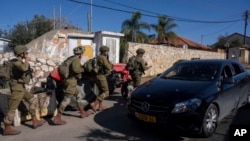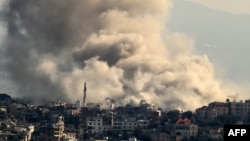Renewed rocket launches from Hezbollah militants in Lebanon and a wave of retaliatory strikes by Israel are intensifying pressure on a days-old ceasefire aimed at calming tensions in the troubled region.
Israel Defense Forces (IDF) late Monday carried out a series of strikes across Lebanon, accusing the Iranian-backed Hezbollah terror group of defying the deal by targeting Israel with rockets.
“Hezbollah’s launches tonight constitute a violation of the ceasefire agreement between Israel and Lebanon,” the IDF said in a statement on its Telegram channel. “The State of Israel demands that the relevant parties in Lebanon fulfill their responsibilities and prevent Hezbollah's hostile activity from within Lebanese territory.”
Israel said its targets included dozens of Hezbollah rocket launchers, terrorist fighters and other Hezbollah infrastructure.
Lebanon’s Health Ministry late Monday said Israeli strikes in the towns of Haris and Talousa killed nine people and injured three others.
The ministry said earlier that Israeli strikes in southern Lebanon killed two more.
The flurry of strikes followed a Hezbollah rocket attack on an Israeli military position in the disputed Shebaa Farms area, which Hezbollah described as a “defensive warning strike.”
But despite the revived hostilities and tough talk from both Israeli and Hezbollah officials, U.S. officials expressed hope Monday that a temporary peace will prevail.
"Broadly speaking, it's our assessment that despite some of these incidents that we're seeing, the ceasefire is holding" Pentagon press secretary Major General Pat Ryder said Monday during a briefing with reporters.
“We will continue to work with partners in the region to ensure that the ceasefire has the best potential for succeeding," he added.
U.S. State Department officials Monday, likewise, said they have not seen indications that the ceasefire is in danger of collapsing, despite accusations by both side of violations.
“This is work that's ongoing,” said State Department spokesperson Matthew Miller. “We take all of them very seriously, and we work through the [ceasefire] mechanism that we set up to adjudicate them.”
Negotiators from the United States and France have touted the ceasefire deal as a chance to forge a more permanent cessation of hostilities between Israel and Lebanon, and end fighting that erupted following the October 7, 2023, attack by Hezbollah ally Hamas on Israel.
During its attack, Hamas killed about 1,200 people and took another 250 hostage. There are still about 100 hostages held in Gaza, with about one-third believed to be dead.
Israeli officials announced Monday that Omer Neutra, an Israeli American soldier who was presumed captured in the 2023 attack, is now believed to have been killed, without explaining how it arrived at that assessment.
In a statement, U.S. President Joe Biden said he and first lady Jill Biden were “devastated and outraged” to learn of Neutra’s killing, saying he had visited with Neutra’s parents less than a month ago.
To the families of those still held hostage in Gaza, Biden said, “We see you. We are with you. And I will not stop working to bring your loved ones back home where they belong.”
Israeli President Isaac Herzog said in a statement that the country’s hearts are with Neutra’s family.
“We must fulfill the ultimate imperative: to return Omer and all our abducted men and women — the living to their families, and the fallen and murdered to be laid to rest,” Herzog said.
U.S. President-elect Donald Trump echoed that call Monday, issuing a warning on his social media platform.
“[I]f the hostages are not released prior to January 20, 2025, the date that I proudly assume Office as President of the United States, there will be ALL HELL TO PAY in the Middle East, and for those in charge who perpetrated these atrocities against Humanity,” Trump wrote in a post on Truth Social.
“Those responsible will be hit harder than anybody has been hit in the long and storied History of the United States of America,” he added. “RELEASE THE HOSTAGES NOW!”
In its counteroffensive in Gaza, Israel has killed more than 44,400 Palestinians, more than half of them women and children, according to the Gaza Health Ministry, which does not distinguish in its death toll between civilians and combatants. Israel, without providing evidence, says it has killed more than 17,000 militants.
A top U.S. national security official said Sunday that a ceasefire in Gaza is now “more likely” following the ceasefire reached in Lebanon.
The U.S. and other negotiators “may have a chance” to end 14 months of fighting in Gaza, White House national security adviser Jake Sullivan told CNN’s “State of the Union” show but declined to make a prediction, “because we’ve come close before.”
Herzog said Sunday, "There are negotiations taking place behind the scenes, and it can be done.”
Sullivan told NBC’s “Meet the Press” show, “We are engaged deeply with the key players in the region, and there is activity even today. There will be further conversations and consultations, and our hope is that we can generate a ceasefire and hostage deal, but we're not there yet.”
Sullivan spoke after Hamas on Saturday released a videotape of one of the hostages, Israeli American Edan Alexander. Speaking under duress, Alexander blamed Israeli Prime Minister Benjamin Netanyahu for the 2023 Hamas attack on Israel, saying, "The prime minister is supposed to protect his soldiers and citizens, and you abandoned us.”
Sullivan said the video was “a cruel reminder of Hamas' brutality and of the fact that they are holding so many hostages from so many countries.”
The United States, Qatar and Egypt have spent much of the past year trying to broker a ceasefire in Gaza and the release of the remaining hostages. But the talks have been stalemated, with Israel rejecting Hamas' demand for a complete withdrawal from the territory, and Israel vowing that any vestige of Hamas control in the narrow territory along the Mediterranean Sea will be erased.
Some material in this report came from The Associated Press, Agence France-Presse and Reuters.






